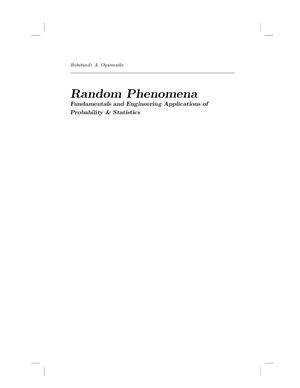CRC, 2009. - 1056 pages.
Many of the problems that engineers face involve randomly varying phenomena of one sort or another. However, if characterized properly, even such randomness and the resulting uncertainty are subject to rigorous mathematical analysis.
Taking into account the uniquely multidisciplinary demands of 21st-century science and engineering, Random Phenomena: Fundamentals of Probability and Statistics for Engineers provides students with a working knowledge of how to solve engineering problems that involve randomly varying phenomena. Basing his approach on the principle of theoretical foundations before application, Dr. Ogunnaike presents a classroom-tested course of study that explains how to master and use probability and statistics appropriately to deal with uncertainty in standard problems and those that are new and unfamiliar.
Giving students the tools and confidence to formulate practical solutions to problems, this book offers many useful features, including:
Unique case studies to illustrate the fundamentals and applications of probability and foster understanding of the random variable and its distribution.
Examples of development, selection, and analysis of probability models for specific random variables.
Presentation of core concepts and ideas behind statistics and design of experiments.
Selected "special topics, " including reliability and life testing, quality assurance and control, and multivariate analysis.
As classic scientific boundaries continue to be restructured, the use of engineering is spilling over into more non-traditional areas, ranging from molecular biology to finance. This book emphasizes fundamentals and a "first principles" approach to deal with this evolution. It illustrates theory with practical examples and case studies, equipping readers to deal with a wide range of problems beyond those in the book.
Many of the problems that engineers face involve randomly varying phenomena of one sort or another. However, if characterized properly, even such randomness and the resulting uncertainty are subject to rigorous mathematical analysis.
Taking into account the uniquely multidisciplinary demands of 21st-century science and engineering, Random Phenomena: Fundamentals of Probability and Statistics for Engineers provides students with a working knowledge of how to solve engineering problems that involve randomly varying phenomena. Basing his approach on the principle of theoretical foundations before application, Dr. Ogunnaike presents a classroom-tested course of study that explains how to master and use probability and statistics appropriately to deal with uncertainty in standard problems and those that are new and unfamiliar.
Giving students the tools and confidence to formulate practical solutions to problems, this book offers many useful features, including:
Unique case studies to illustrate the fundamentals and applications of probability and foster understanding of the random variable and its distribution.
Examples of development, selection, and analysis of probability models for specific random variables.
Presentation of core concepts and ideas behind statistics and design of experiments.
Selected "special topics, " including reliability and life testing, quality assurance and control, and multivariate analysis.
As classic scientific boundaries continue to be restructured, the use of engineering is spilling over into more non-traditional areas, ranging from molecular biology to finance. This book emphasizes fundamentals and a "first principles" approach to deal with this evolution. It illustrates theory with practical examples and case studies, equipping readers to deal with a wide range of problems beyond those in the book.

